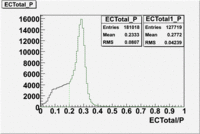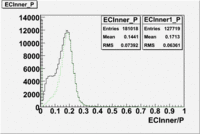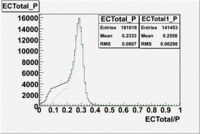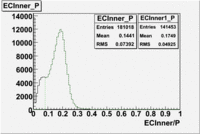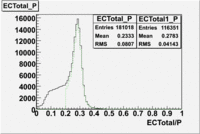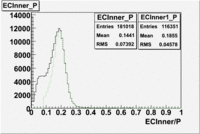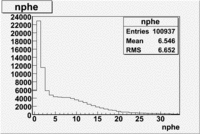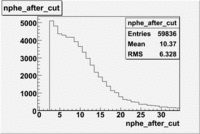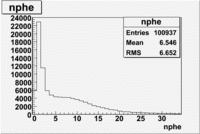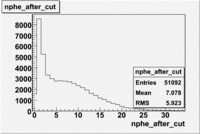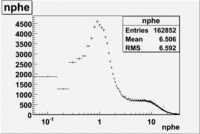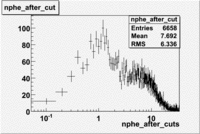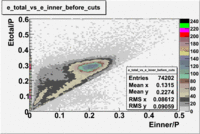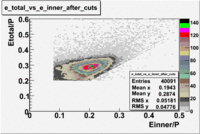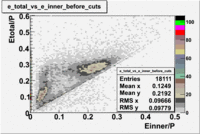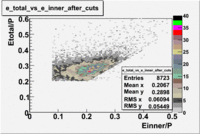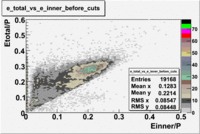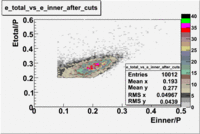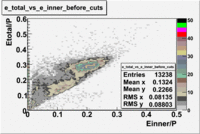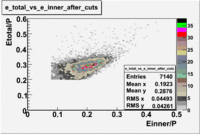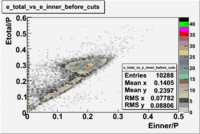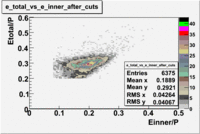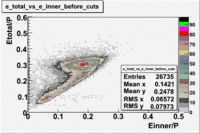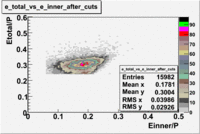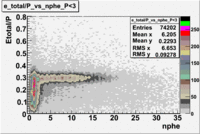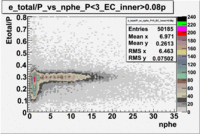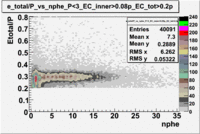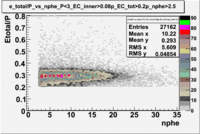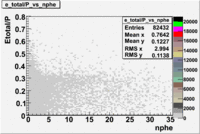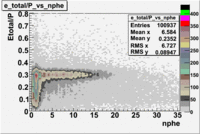Difference between revisions of "Analysis"
(→Pion) |
|||
| Line 266: | Line 266: | ||
|5764||-2250||26776||26851||dst26779_02.B00|| %|| %|| %||662||15.9||21.3||44 | |5764||-2250||26776||26851||dst26779_02.B00|| %|| %|| %||662||15.9||21.3||44 | ||
|} | |} | ||
| + | |||
| + | ===Table for Pions=== | ||
===Plot of EC_tot/P vs nphe for Pions=== | ===Plot of EC_tot/P vs nphe for Pions=== | ||
Revision as of 03:33, 22 August 2007
EG1 run database
run summary
polarization info
Particle Identification
Electron
Cuts
Calorimeter based cuts
The distributions below represent two types of cuts applied to improve the electron particle identification (PID) using a 4 GeV electron beam incident on an NH3 target. The electron calorimeter is segmented into an inner and an outer region. The total energy absorbed by the calorimeter system is recorded in the variable . The momentum () is calculated using the reconstructed track and the known torus magnetic field. The distributions of and are shown below where both have been divided by the electron momentum and no cuts have been applied.
Without any cuts we have 181018 entries. After using the following cut we are getting 127719 entries, which is about 70.55% of 181018.
After the cut on the energy deposited into inner part of electron calorimeter, number of entries decreases by 22%.
Both cuts and
In case of using the cuts of the total deposited energy and the energy deposited into inner calorimeter number of entries decreases ~36%
summary table
The "# of triggers" columns represents the number of events which generated a signal above threshold in the calorimeter and the scintillator. The expected # of events column represents the number of reconstructed events with tracks that also make it through the cuts defined in the table.
The semi-inclusive analysis will focus on the 4 GeV and 6 GeV data which have both inbending and outbending torus settings. Specifically runs 28074 - 28579 ( 4 GeV) and Runs 27356 - 27499 and 26874 - 27198 (6 GeV)
| Beam Energy | Torus Current | Begin Run | End Run | file used | cuts | # trig() | expected # evts() | p<3,,(%) | p>3,,(%) | ||
|---|---|---|---|---|---|---|---|---|---|---|---|
| and | |||||||||||
| 1606 | 1500 | 25488 | 25559 | dst25504_02.B00 | 64% | 49.5% | 78% | 60 | 3.2 | ||
| 1606 | 1946 | 25560 | 25605 | 44 | |||||||
| 1606 | 1500 | 25669 | 25732 | dst25669_02.B00 | 64% | 49% | 78% | 226 | 10 | ||
| 1606 | 1500 | 25742 | 26221 | dst25754_02.B00 | 21% | 11% | 24% | 3154 | 13.3 | ||
| 1606 | -1500 | 26222 | 26359 | dst26224_02.B00 | 4.6% | 3% | 6.6% | 703 | 13.1 | ||
| 1724 | -1500 | 27644 | 27798 | dst27649_02.B00 | 4.8% | 2.2% | 5.9% | 211 | 20 | ||
| 1724 | 1500 | 28512 | 28526 | 159 | |||||||
| 1724 | -1500 | 28527 | 28532 | 93 | |||||||
| 2288 | 1500 | 27205 | 27351 | dst27225_02.B00 | 20.2% | 13% | 25.6% | 1647 | 16.1 | ||
| 2562 | -1500 | 27799 | 27924 | dst27809_02.B00 | 5.7% | 4.6% | 8.6% | 1441 | 13.1 | ||
| 2562 | -1500 | 27942 | 27995 | dst27942_02.B00 | 6.1% | 4.4% | 8.9% | 841 | 32.3 | ||
| 2562 | 1500 | 28001 | 28069 | dst28002_02.B00 | 27.8% | 13% | 29.6% | 1013 | 30.7 | ||
| 2792 | -1500 | 27936 | 27941 | dst27937_02.B00 | 6.7% | 5% | 9.9% | 69 | 20.6 | ||
| 3210 | -2250 | 28549 | 28570 | 436 | |||||||
| 4239 | 2250 | 28074 | 28277 | dst28075_02.B00 | 35.3% | 23.9% | 40.5% | 2278 | 19.6 | ||
| 4239 | -2250 | 28280 | 28479 | dst28281_02.B00 | 9.1% | 9.4% | 13.6% | 2620 | 15.2 | ||
| 4239 | 2250 | 28482 | 28494 | 7 | |||||||
| 4239 | -2250 | 28500 | 28505 | 107 | |||||||
| 4239 | 2250 | 28506 | 28510 | dst28509_02.B00 | 29.5% | 22% | 36% | 75 | 18.1 | ||
| 5627 | 2250 | 27356 | 27364 | dst27358_02.B00 | 33.2% | 27.8% | 41.3% | 56 | 19.4 | 44.6 | 40.1 |
| 5627 | -2250 | 27366 | 27380 | dst27368_02.B00 | 12.6% | 14.8% | 19.5% | 130 | 13.6 | 25.3 | 8.8 |
| 5627 | 2250 | 27386 | 27499 | dst27388_02.B00 | 33.4% | 27.8% | 41.4% | 1210 | 20.2 | 44.8 | 40.1 |
| 5627 | 965 | 27502 | 27617 | 493 | |||||||
| 5735 | -2250 | 26874 | 27068 | dst26904_02.B00 | 13% | 15% | 20% | 1709 | 19.9 | 25.6 | 9.1 |
| 5735 | 2250 | 27069 | 27198 | dst27070_02.B00 | 33.3% | 28.8% | 42.2% | 1509 | 15 | 46 | 40.2 |
| 5764 | -2250 | 26468 | 26722 | dst26489_02.B00 | 12.2% | 14.4% | 19.1% | 1189 | 10 | 24.6 | 9.3 |
| 5764 | 0 | 26723 | 26775 | 268 | |||||||
| 5764 | -2250 | 26776 | 26851 | dst26779_02.B00 | 13.5% | 15.5% | 20.5% | 662 | 15.9 | 26.4 | 9.2 |
Cut on the number of photoelectrons
In this case is used a cut on the number of photoelectrons, which is . The plots below show the
effect of the number of photoelectrons cuts on the Cerenkov distribution. We see that after using cut the number of entries decreases ~40.7%
Used cuts and
Used file dst28181_03(energy 4.2GeV). In this case was applied cuts on the polar angle() and momentum(). Number of entries decreased by 96%(?????????????/)
Tamuna: follow this link to see the OSIPENKO cuts described in part 5 add graphs of their effect below Dr. Forest I think I did this cuts but they do not change a lot. Maybe I am wrong.
Plot of vs
In this case is used file dst27070(Energy 5.735 GeV and Torus 2250) and are applied the following EC cuts: For ECtotal - , for EC inner - .
P<3
After using above cuts the number of entries decreases ~46%
0.5<P<1
The number of entries decreased by ~51.8%
1<P<1.5
The number of entries decreased approximately by 47.8%
1.5<P<2
In this case the number of entries decreased by 46.1%
2<P<2.5
In this case the number of entries decreased by 38%
P>3
Used file dst27070(Energy 5.735 GeV and Torus 2250) and are applied the following EC cuts: For ECtotal - , for EC inner - .
The number of entries decreased by~40.2%
Plot of EC_tot/P vs nphe for Electrons
Used file dst27070(Energy 5.735 GeV and Torus 2250)
p<3 GeV
Does the graph below only contain electrons? I assume so just restate it here for clarity. At the bottom of this
section you have plots for pions and electrons side by side. Move those to the pion section below. Does this
mean there are a lot of pions mis-identified as electrons?
Dr. Forest, the graph bellow does not contain only electrons, there should be some contamination, because I have just
p<3 GeV cut.
p<3 GeV and
p<3 GeV, and
p<3 GeV, , and nphe>2.5
Dr. Forest , in this case I applied all cuts as you see.
The histogram below is for electrons.
Pion
Summary Table
Tamuna: The pion id code is at:
http://www.jlab.org/Hall-B/secure/eg1/EG2000/josh/pion.cc
There are two subroutines, one which uses a constant cut for every paddle, one that has a different cut for every paddle. The only other requirement is that the particle be produced with an angle less than 48 degrees in the lab (so as to miss the magnet can). The requirment that the pion fail the electron cut is not written in stone. I still haven't checked to see the effects of it.
| Beam Energy | Torus Current | Begin Run | End Run | file used | cuts | # trig() | expected # evts() | p>3,,(%) | p<3,,(%) | ||
|---|---|---|---|---|---|---|---|---|---|---|---|
| and | |||||||||||
| 1606 | 1500 | 25488 | 25559 | dst25504_02.B00 | 60 | 3.2 | |||||
| 1606 | 1500 | 25669 | 25732 | dst25669_02.B00 | 226 | 10 | |||||
| 1606 | 1500 | 25742 | 26221 | dst25754_02.B00 | 3154 | 13.3 | |||||
| 1606 | -1500 | 26222 | 26359 | dst26224_02.B00 | 703 | 13.1 | |||||
| 1724 | -1500 | 27644 | 27798 | dst27649_02.B00 | 211 | 20 | |||||
| 2288 | 1500 | 27205 | 27351 | dst27225_02.B00 | 1647 | 16.1 | |||||
| 2562 | -1500 | 27799 | 27924 | dst27809_02.B00 | 1441 | 13.1 | |||||
| 2562 | -1500 | 27942 | 27995 | dst27942_02.B00 | 841 | 32.3 | |||||
| 2562 | 1500 | 28001 | 28069 | dst28002_02.B00 | 1013 | 30.7 | |||||
| 2792 | -1500 | 27936 | 27941 | dst27937_02.B00 | % | 69 | 20.6 | ||||
| 4239 | 2250 | 28074 | 28277 | dst28075_02.B00 | % | % | % | 2278 | 19.6 | ||
| 4239 | -2250 | 28280 | 28479 | dst28281_02.B00 | % | % | % | 2620 | 15.2 | ||
| 4239 | 2250 | 28506 | 28510 | dst28509_02.B00 | % | % | % | 75 | 18.1 | ||
| 5627 | 2250 | 27356 | 27364 | dst27358_02.B00 | % | % | % | 56 | 19.4 | 36.1 | 31.5 |
| 5627 | -2250 | 27366 | 27380 | dst27368_02.B00 | % | % | % | 130 | 25 | 43.8 | |
| 5627 | 2250 | 27386 | 27499 | dst27388_02.B00 | % | % | % | 1210 | 20.2 | 39.8 | 32.4 |
| 5735 | -2250 | 26874 | 27068 | dst26904_02.B00 | % | % | % | 1709 | 19.9 | 22.5 | 46.4 |
| 5735 | 2250 | 27069 | 27198 | dst27070_02.B00 | % | % | % | 1509 | 15 | 34.6 | 32.9 |
| 5764 | -2250 | 26468 | 26722 | dst26489_02.B00 | % | % | % | 1189 | 10 | 25.2 | 44.3 |
| 5764 | -2250 | 26776 | 26851 | dst26779_02.B00 | % | % | % | 662 | 15.9 | 21.3 | 44 |
